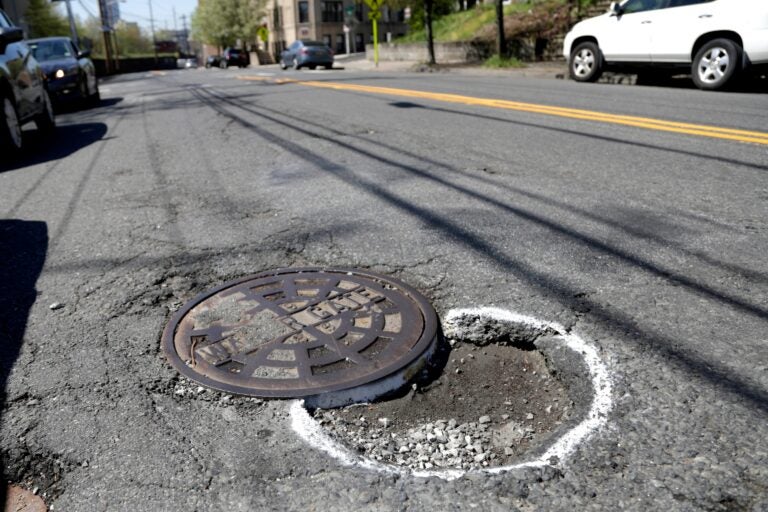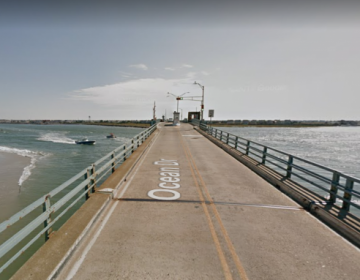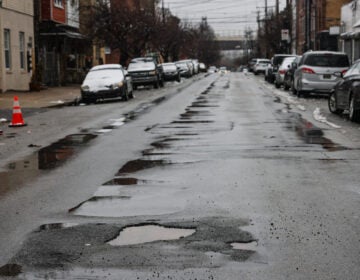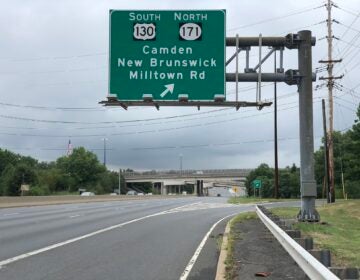New Jersey has a new law requiring more information about potholes from the state Department of Transportation
A state lawmaker says the law will provide greater transparency and help legislators budget for needed infrastructure work.
Listen 0:59
File - A pothole is outlined by paint near a manhole along Summit Avenue, Tuesday, April 23, 2019, in Jersey City, N.J. (AP Photo/Julio Cortez)
From Camden and Cherry Hill to Trenton and the Jersey Shore, what about life in New Jersey do you want WHYY News to cover? Let us know.
A new law in New Jersey requires the state Department of Transportation to provide more information about potholes in the state’s roadway pavement system report, which is published annually.
Acting Gov. Tahesha Way signed the legislation Monday. The prime sponsor, Republican state Sen. Tony Bucco, said the bill requires the state agency to include specific data on the number of potholes filled during the calendar year, the price tag for the repair and the number of pothole damage claims filed by state residents.
Pothole dangers are lurking
Bucco said New Jerseyans have to frequently navigate roads that are littered with potholes.
Between fiscal years 2020 and 2024, NJDOT repaired around 153,000 potholes on state roads per year.
“Unless we really know what the cost is, as a result of these potholes, and the impact that it’s having, we can’t really make a decision as to how much to invest in filling them and making the roads safer,” Bucco said.
He said potholes are a huge cause of worry for Garden State residents, not just because of the cost of repair. A blown tire or broken suspension part can cause a motorist to lose control of the vehicle and increase the chance of a serious accident.
According to an American Automobile Association report, the average cost of repairing car damage caused by a pothole is $406.
A year-round problem
Potholes are typically created when water seeps into cracks in worn asphalt and then freezes, which expands asphalt and causes a crater. But very hot weather can cause asphalt to soften, deform and cave under pressure, creating a pothole.
Democratic state Sen. Pat Diegnan, who chairs the Senate Transportation committee, co-sponsored the legislation.
He said road conditions are different than they used to be because of climate change.
“I remember when I was young, they used to say you’d have most of your potholes when you had a tough winter,” he said. “We don’t seem to be having tough winters, but we do seem to be having incredibly hot summers, and I think it’s affecting our roadways.”
Reporting potholes and filing a claim
Drivers in the Garden State can report potholes by calling 1-800-POTHOLE (1-800-768-4653) or by visiting the NJDOT website and using a mapping feature to help identify the pothole’s exact location.
For pothole damage claims on New Jersey state highways and interstates, drivers can contact the Department of Treasury’s Office of Risk Management.
If you want to report a pothole on a county road, you must contact the appropriate jurisdiction.
Bucco said it makes sense to give everyone as much information as possible about potholes.
“This adds a level of transparency, provides some knowledge to the state, so we can make sure as legislators we fund the Department of Transportation [appropriately] to correct these potholes,” he said.
Diegnan agreed.
“We have different conditions in different parts of the state,” he said. “The more information we have, the better, and then we plan accordingly.”

Get daily updates from WHYY News!
WHYY is your source for fact-based, in-depth journalism and information. As a nonprofit organization, we rely on financial support from readers like you. Please give today.






